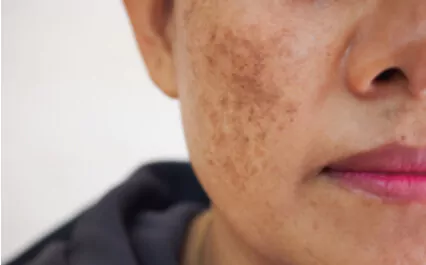What causes Melasma?
As a natural defense mechanism, the skin increases production of melanin through a complex process that involves numerous different types of cells in the skin. These may include hormones and immune cells, among others. The process begins when the skin receives a signal of potential damage and usually lasts for a brief period. Melasma develops when this natural process is too robust or does not turn off.
Multiple factors can contribute to melasma. For example:
- There can be genetic contributors, meaning that a predisposition to melasma may be inherited. Many people with melasma report that a parent or other family member had the condition, too.
- Hormonal factors can affect melasma. Melasma may indicate underlying hormonal imbalances or result from hormonal changes related to pregnancy.
- Certain birth control pills have been linked to melasma because of their influence on hormones.
- Sun exposure—especially over a significant amount of time—can lead to hyperpigmentation.
- High heat exposure and stress have been linked to melasma to some degree.






